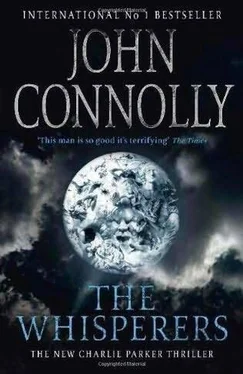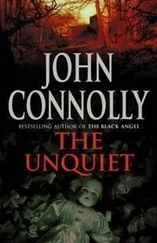‘I’m not sure what you’re implying,’ said Webber.
‘I’m not implying anything. I’m telling you what occurred. You became greedy. You had dealt in the past with the collector Graydon Thule, and you knew that Thule had a particular passion for grimoires. You made him aware of the existence of the La Rochelle Grimoire. In return, he agreed to pay you a finder’s fee, and offered one hundred thousand dollars more for the grimoire than the foundation had earmarked in order to ensure that it would go to him. You did not pass on that full amount to the seller, but kept half of it for yourself, in addition to the finder’s fee. You then paid a subagent in Brussels to act on your behalf, and the grimoire went to Thule. I don’t think I’ve missed out on any details, have I?’
Webber was tempted to argue, to deny the truth of what Herod had said, but he could not. It had been foolish to think that he might be able to get away with the deception, but only in retrospect. At the time, it had seemed perfectly possible, even reasonable. He needed the money: his cash flow had slowed in recent months, for his business was not immune to the economic downturn. In addition, his daughter was a second year med student, and her fees were crucifying him. While the Gutelieb Foundation, like most of his clients, paid well, it did not pay well often enough, and Webber had been struggling for some time. He had made 120,000 dollars in total from acquiring the grimoire for Thule, once he had paid off the subagent in Brussels. That was a lot of money for him: enough to ease his debts, cover his share of Suzanne’s fees for the next year, and leave himself with a little in the bank. He began to feel a sense of indignation at Herod and his manner. Webber did not work for the Gutelieb Foundation. His obligations to it were minimal. True, his actions in the sale of the grimoire were not strictly honorable, but such deals happened all the time. Screw Herod. Webber had enough money to get by on for now, and he was in Thule ’s good books. If the Gutelieb Foundation cut him off, then so be it. Herod couldn’t prove anything of what he had just said. If inquiries were made about the money, Webber had enough false bills of sale to explain away a small fortune.
‘I think you should go now,’ said Webber. ‘I’d like to get back to preparing my meal.’
‘I’m sure that you would. Unfortunately, I am afraid that I can’t let the matter rest there. Some form of recompense must be made.’
‘I don’t think so. I don’t know what you’re talking about. Yes, I’ve done some work for Graydon Thule in the past, but he has his sources too. I can’t be held responsible for every failed sale.’
‘You’re not being held responsible for every failed sale, just this one. The Gutelieb Foundation is very concerned with issues of responsibility. Nobody forced you to act as you did. That is the joy of free will, but also its curse. You must accept the blame for your actions. Amends must be made.’
Webber began to speak, but Herod silenced him with a raised hand.
‘Don’t lie to me, Mr. Webber. It insults me, and makes a fool out of you. Be a man. Acknowledge what you did, and we can set about arranging restitution. Confession is good for the soul.’ He reached out and laid his right hand upon Webber’s. Herod’s skin felt damp and cold, painfully so, but Webber was unable to move. Herod’s grip seemed to weigh him down.
‘Come,’ said Herod. ‘All that I ask from you is honesty. We know the truth, and now it is simply a matter of finding a way that we can both put this behind us.’
Those dark eyes glinted, like black spinels in snow. Webber was transfixed. He nodded once, and Herod responded with a similar gesture.
‘Things have been very difficult lately,’ said Webber. His eyes grew hot, and the words caught in his throat, as though he were about to cry.
‘I know that. These are hard times for many.’
‘I’ve never acted in this way before. Thule contacted me about another matter, and I just let it slip. I was desperate. It was wrong of me. I apologize: to you, and to the foundation.’
‘Your apology is accepted. Unfortunately, we now have to discuss the matter of restitution.’
‘Half of the money is already gone. I don’t know what sum you were considering but-’
Herod appeared surprised. ‘Oh, it’s not a matter of money,’ he said. ‘We don’t require money.’
Webber sighed with relief. ‘Then what?’ he said. ‘If you need information on items of interest, I may be able to provide it at a reduced rate. I can ask some questions, check my contacts. I’m sure that I can find something that will make up for the loss of the grimoire and-’
He stopped talking. There was now a manila envelope on the table, the kind with a cardboard back used to protect photographs.
‘What is that?’ asked Webber.
‘Open it and see.’
Webber picked up the envelope. There was no name or address on it, and it was unsealed. He reached inside and withdrew a single color photograph. He recognized the woman in the picture, captured when she was clearly unaware of the camera, her head turned slightly to the right as she gazed over her shoulder, smiling at someone or something out of shot.
It was his daughter, Suzanne.
‘What does this mean?’ he asked. ‘Are you threatening my daughter?’
‘Not as such,’ said Herod. ‘As I told you before, the foundation is very interested in concepts of free will. You had a choice in the matter of the grimoire, and you made it. Now, I have been instructed to give you another choice.’
Webber swallowed. ‘Go on.’
‘The foundation has authorized the rape and murder of your daughter. It may be some consolation to you to hear that the acts do not have to be committed in that order.’
Instinctively, Webber looked to his gun, then began to reach for it.
‘I should warn you,’ continued Herod, ‘that if anything happens to me, then your daughter will not see out this night, and her sufferings will be greatly increased. You may yet have use for that gun, Mr. Webber, but not now. Let me finish, then consider.’
Uncertain of what to do, Webber did nothing, and his fate was sealed.
‘As I said,’ Herod continued, ‘an action has been authorized, but it does not have to be carried out. There is another option.’
‘Which is?’
‘You take your own life. That is your choice: your life, ended quickly, or the life of your daughter, taken slowly and with much pain.’
Webber stared at Herod, dumbfounded.
‘You’re insane.’ But even as he said it, he knew that it wasn’t true. He had looked into Herod’s eyes, and he had seen nothing there but absolute sanity. It was possible that, with enough pain, a person might be driven to madness, but this was not the case with the man who sat opposite him. Instead, his suffering had given him perfect clarity: he had no illusions about the ways of the world, only an insight into its capacity for inflicting agony.
‘No, I am not. You have five minutes to choose. After that, it will be too late to stop what is about to occur.’
Herod sat back. Webber picked up the gun and pointed it at him, but Herod did not even blink.
‘Call. Tell them to leave her alone.’
‘So you’ve made your choice?’
‘No. There is no choice. I’m warning you that if you don’t make the call, I’ll kill you.’
‘And then your daughter will die.’
‘I could torture you. I can shoot you in the knee, the groin. I can keep hurting you until you accede to my demand.’
‘Your daughter will still die. You know that. At the most basic level, you acknowledge the truth of what you have been told. You must accept it, and choose. Four minutes, thirty seconds.’
Читать дальше












